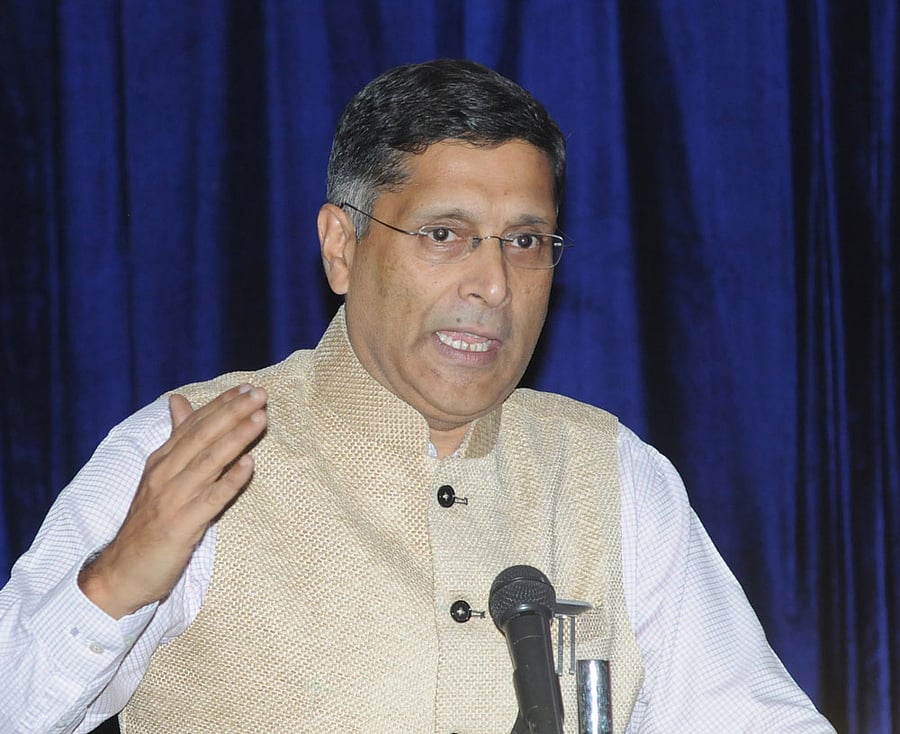Survey may have chapter on universal basic income
Last Updated IST

Chief Economic Adviser Arvind Subramanian. DH file photo
The Economic Survey to be presented in Parliament may feature a chapter on universal basic income this year. Chief Economic Adviser Arvind Subramanian has promised to float the idea to let the government think over it. Universal basic income is a form of social security where the State transfers a sum of money to poor citizens to supplement their income to reach a certain threshold.
In the Indian context, it may mean people below the poverty line. Recently Subramanian had said that his effort would be to add a new chapter in the Economic Survey of 2017. He had also argued that the scheme can be tried on a pilot basis in the most disadvantaged regions of the country.
More recently even the Niti Aayog has come in favour of UBI. Its CEO Amitabh Kant has said that the government could try UBI in the form of interest-free loans to the poor. He has argued that UBI will be important in the context of disruption being caused in the job market through automation. But he also added that the government needed to do an in-depth analysis before launching such a scheme.
A government official said that at this stage it would only be an idea to be discussed and debated since the country already has some social security programmes for the poor. Mahatma Gandhi National Rural Employment Guarantee Scheme, the world's largest public works programme, is one such programme which provides work and wages for 100 days in a year.
“It will be difficult for the government to replace such programmes and bring in UBI,” he said but did not rule out a cost-benefit analysis at this stage. Among the critics of UBI is former finance minister P Chidambaram who said, “UBI is not a novel idea. Countries that have a comprehensive social security scheme provide a cash payment as well as food coupons to persons entitled to receive social security benefits (the poor, unemployed, disabled, aged). In India, there is no comprehensive social security scheme. We have the MGNREGA scheme that bears a similarity to UBI”. Recently, Switzerland turned down the idea of UBI by an overwhelming majority due to its financial implications.
In the Indian context, it may mean people below the poverty line. Recently Subramanian had said that his effort would be to add a new chapter in the Economic Survey of 2017. He had also argued that the scheme can be tried on a pilot basis in the most disadvantaged regions of the country.
More recently even the Niti Aayog has come in favour of UBI. Its CEO Amitabh Kant has said that the government could try UBI in the form of interest-free loans to the poor. He has argued that UBI will be important in the context of disruption being caused in the job market through automation. But he also added that the government needed to do an in-depth analysis before launching such a scheme.
A government official said that at this stage it would only be an idea to be discussed and debated since the country already has some social security programmes for the poor. Mahatma Gandhi National Rural Employment Guarantee Scheme, the world's largest public works programme, is one such programme which provides work and wages for 100 days in a year.
“It will be difficult for the government to replace such programmes and bring in UBI,” he said but did not rule out a cost-benefit analysis at this stage. Among the critics of UBI is former finance minister P Chidambaram who said, “UBI is not a novel idea. Countries that have a comprehensive social security scheme provide a cash payment as well as food coupons to persons entitled to receive social security benefits (the poor, unemployed, disabled, aged). In India, there is no comprehensive social security scheme. We have the MGNREGA scheme that bears a similarity to UBI”. Recently, Switzerland turned down the idea of UBI by an overwhelming majority due to its financial implications.
